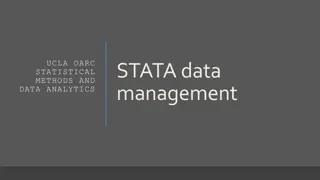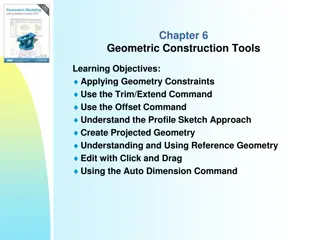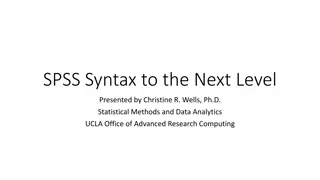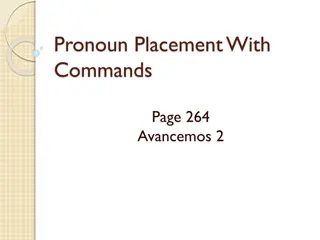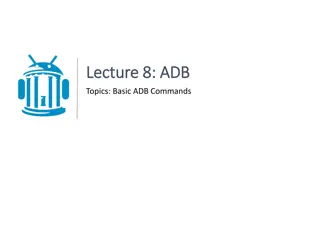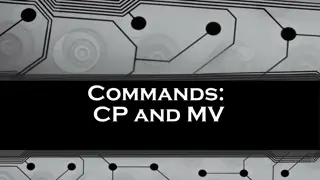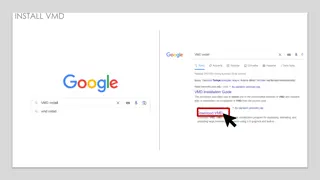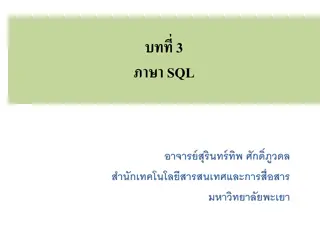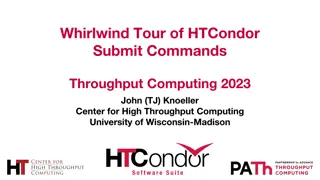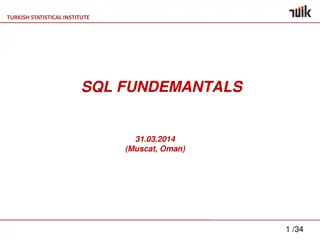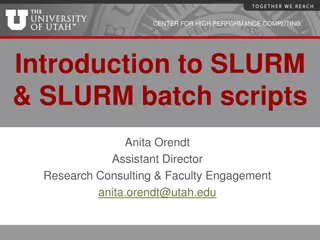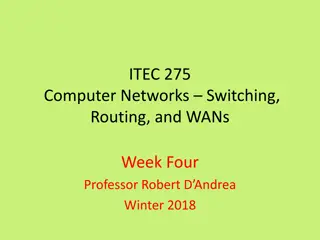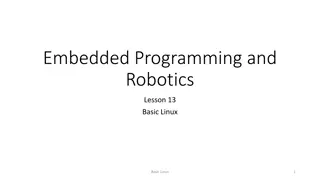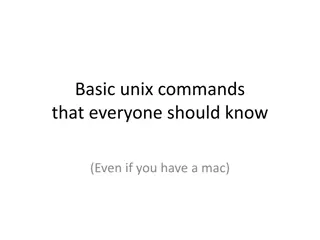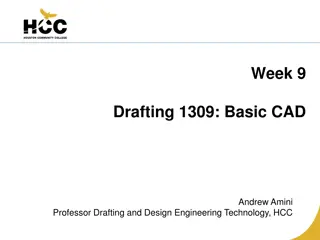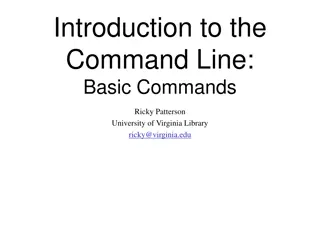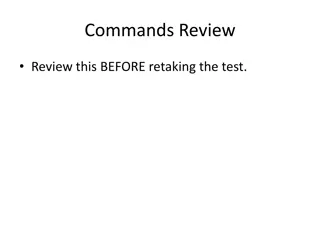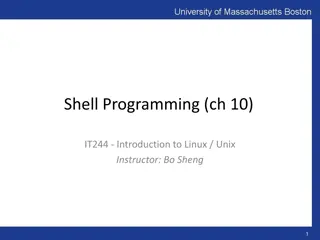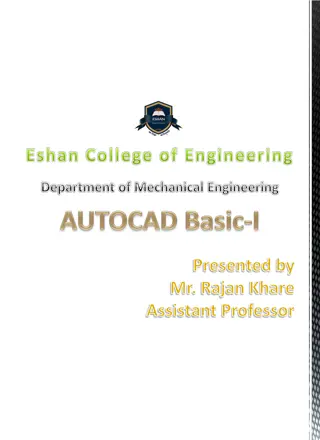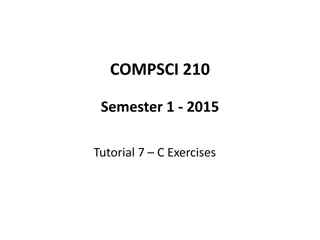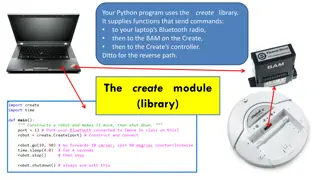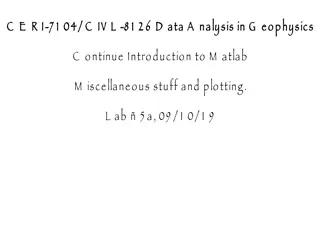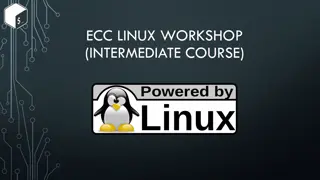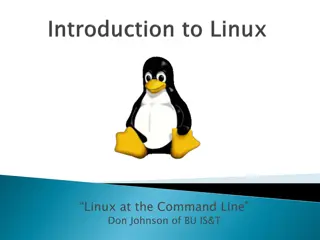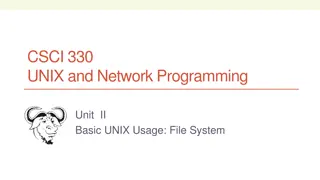Data Management Workshop: Stata Commands for Statistical Analysis
This workshop conducted by UCLA's OARC covers essential Stata commands for preparing data sets for statistical analysis. It includes topics like inspecting and creating variables, handling missing data, merging datasets, and processing data efficiently. Participants will learn to use do-files, write
5 views • 79 slides
Autodesk Inventor Geometric Construction Tools Overview
Explore the functionality of Autodesk Inventor's geometric construction tools, such as applying geometry constraints, utilizing trim/extend and offset commands, understanding profile sketches, creating projected geometry, and editing sketches with click and drag. Discover how to enhance efficiency i
3 views • 12 slides
Mastering SPSS Syntax for Advanced Data Analysis
Delve into the world of SPSS syntax with this workshop by Christine R. Wells, Ph.D., where you will learn to efficiently work with SPSS commands and subcommands, understand when commands execute, and optimize your data analysis process. Discover insider tips on setting options, using SPSS version 28
2 views • 141 slides
Pronoun Placement with Commands in English and Spanish
Understanding pronoun placement in commands is crucial in both English and Spanish. In English, pronouns are placed after the verb in both affirmative and negative commands. However, in Spanish, affirmatives attach pronouns while negatives place them in front of the verb. Examples and accent rules a
1 views • 5 slides
Android Debug Bridge (ADB) Commands
Android Debug Bridge (ADB) is a powerful command-line utility used to communicate with Android devices. It allows you to perform various tasks such as listing connected devices, installing apps, transferring files, taking screenshots, and more. Learn about ADB client-server architecture, connecting
3 views • 16 slides
Pronoun Placement Rules in Spanish Sentences
Clear up confusion around the placement of reflexive, direct object, and indirect object pronouns in Spanish sentences and commands. Learn the placement rules for different types of pronouns in statements and commands, including examples for single-verb and two-verb sentences. Understand the order o
2 views • 10 slides
CP and MV Commands in Unix/Linux
CP and MV commands in Unix/Linux are essential for copying and moving files or directories. CP is used to copy files with various options for different scenarios, while MV is used to move or rename files. Learn examples and practical usage of these commands to efficiently manage your files on the te
0 views • 5 slides
Step-by-Step Guide to Installing VMD Software and Using Linux Commands
Explore the comprehensive guide on installing Virtual Molecular Dynamics (VMD) software, along with insights into using Linux commands for data manipulation in Tk console. The tutorial covers registering, saving to desktop, and navigating through folders, concluding with loading data into VMD for vi
1 views • 9 slides
Expressing Hearts in Song: Biblical Commands and Inspiration
Reflecting on the biblical commands to express joy and gratitude through song, this content emphasizes the significance of singing in cheerful moments, highlighting verses from James, Romans, Ephesians, Acts, and Colossians. The imagery and messages underscore the importance of music as a means to p
1 views • 12 slides
Comprehensive Overview of SQL Commands and Language Categories
In this detailed guide, you will learn about Structured Query Language (SQL) including its various commands such as Data Definition Language (DDL), Data Manipulation Language (DML), Data Control Language (DCL), and Transaction Control Language (TCL). Explore how SQL is used in Database Management Sy
0 views • 15 slides
HTCondor Submit Commands Overview
Comprehensive overview of HTCondor submit file commands, macros, and variables, emphasizing required commands, submit variables, execution point attributes, and containerization in high-throughput computing environments. Includes valuable insights and practical examples for better understanding.
0 views • 33 slides
Comprehensive Review of Clash9 Framework by John Ousterhout
This review delves into the Clash9 framework designed by John Ousterhout, covering key aspects such as classes, main functions, ClashParser, Executor, SubstrParser, and more. The framework involves parsing commands, executing built-in commands, managing variables, configuring pipelines, and handling
0 views • 21 slides
On the Shoulders of Giants: Harnessing Powerful Commands in Stata for Efficient Coding
Stata users can enhance their coding efficiency by utilizing powerful commands that are often overlooked. This presentation showcases examples of commands that can streamline coding work, ranging from interactive use to supporting long programs. By leveraging these commands, users can avoid reinvent
1 views • 51 slides
Turkish Statistical Institute SQL Fundamentals Overview
The Turkish Statistical Institute provides an in-depth look at SQL fundamentals covering main categories, basic SQL commands, set operations, aggregate functions, join operations, and more. SQL, or Structured Query Language, is a special-purpose programming language designed for managing data in RDB
0 views • 33 slides
Introduction to SLURM & SLURM Batch Scripts Overview
Overview of SLURM commands, batch directives, environment variables, running interactive batch jobs, monitoring jobs, and getting additional information. Includes basic SLURM commands, useful aliases, and information on accounts and partitions for job submission.
0 views • 24 slides
Computer Networks and WANs: Week Four Overview
This week's session covers VMware View Client commands, traffic flow device configurations, Asynchronous Transfer Mode (ATM), Quality of Service (QoS), and more. Explore hands-on activities in MIMIC Virtual Lab CCNA and learn essential commands for networking tasks like configuring interfaces, debug
0 views • 70 slides
The Power of Unix Command Line Basics for Text Processing in Bioinformatics
Unix Shell commands such as sort, cut, uniq, join, paste, sed, grep, awk, wc, diff, comm, and cat are essential for text processing in bioinformatics. These tools allow seamless manipulation of text data without the need for intermediate files, making file processing efficient and powerful. By pipin
0 views • 19 slides
Basic Linux Commands Overview for Embedded Programming and Robotics
Embedded Programming and Robotics Lesson 13 provides an introduction to basic Linux commands such as man, ls, cd, cp, and more. Understanding these commands is essential for interacting with the operating system on devices like Raspberry Pi. The lesson also covers important concepts like superuser p
0 views • 17 slides
Essential Unix Commands for Beginners
Learn essential Unix commands such as pwd, ls, cd, mkdir, and man, along with their functionalities and usage in navigating the Unix file system effectively. Understand the basics of directories, file structures, and how to get help using the command line interface.
0 views • 18 slides
CAD Drafting Essentials: Commands and Tools Overview
Explore essential CAD drafting commands including BHATCH for filling areas, DIM for dimensioning, HATCHEDIT for modifying hatches, SCALE for resizing objects, and STRETCH for stretching objects. Learn about controlling dimension variables like Dimasz and Dimadec for precision in your drawings.
0 views • 11 slides
BMC IPMI LED Control Commands
This content provides detailed commands for controlling LEDs using BMC IPMI for RS700A-E11-RS12U server systems. It includes instructions for LED commands, disabling sensor scans, setting GPIO status, and more, along with specific configurations for drive control status and LED blinking patterns for
0 views • 5 slides
Introduction to the Command Line: Basic Commands and Unix Systems
This material provides an overview of fundamental commands in Unix systems, applicable to both Unix and Linux operating systems. It covers topics like directory structure, text file manipulation, file permissions, redirections, pipes, wildcards, and more. Learn about the nature of Unix systems, how
0 views • 43 slides
Spanish III Grammar Review: Present Tense Commands
The content covers Spanish grammar related to the present tense commands, including conjugations of verbs like hablar, beber, and vivir. It discusses stem-changing verbs and their transformations, as well as the usage of the preterit and imperfect tenses in Spanish. Helpful images illustrate verb co
0 views • 21 slides
Spanish Commands Review and Tips for Test Success
Prepare for your test on Spanish commands by reviewing the formation of affirmative, negative, and stem-changing verbs. Learn how to form Ud., Uds., and negative commands, and understand the nuances of -car/gar/zar verbs. Master the use of el, la, los, and las pronouns for effective communication in
0 views • 16 slides
Guide to Giving Negative Commands in Spanish
Learn how to effectively communicate what not to do in Spanish with negative commands. Understand the different forms of negative commands for -AR, -ER/-IR verbs, irregular verbs, direct object pronouns, stem-changing verbs, and verb forms ending in -CAR, -GAR, -ZAR. Master the rules and exceptions
0 views • 12 slides
The Imperative Mood in Language
The imperative mood focuses on giving commands without reference to different time frames. It entails direct statements with the understood recipient mainly being 'you.' Commands in the singular, informal form involve dropping the 's' from the second person singular verb, both in affirmative and neg
0 views • 19 slides
Mastering T Commands in Spanish
Learn how to form affirmative and negative T commands in Spanish, including irregular forms and reflexive verbs. Understand the rules and exceptions for creating commands to communicate effectively in Spanish. Improve your command of the language with practical examples and tips for each type of com
0 views • 8 slides
Negative -T Commands in Spanish
Negative -T commands in Spanish are used to tell someone what not to do. These commands are often directed at friends or familiar individuals. Forming negative -T commands involves starting with the YO form in the present tense, dropping the O for -ER/-IR verbs, adding -ES for -AR verbs, and includi
0 views • 50 slides
Introduction to Linux: Course Overview and Objectives
This introduction to Linux course provides a comprehensive overview of operating systems, including the history, variations, user interface, and essential commands. The course is designed with lectures, labs, and exercises to help participants gain a better understanding of Linux and its practical a
2 views • 77 slides
Learn MADX Commands for Injection and Extraction Systems
In this tutorial led by Dr. Rob Apsimon and Dr. Znur Mete, you will discover how to effectively utilize new MADX commands such as Seqedit, savebeta, and beta0 to manipulate sequences, obtain beam parameters, and create macros for injection and extraction systems. Follow the step-by-step guide to add
0 views • 12 slides
Introduction to Shell Programming in Linux/Unix with Vim and Control Flow Commands
Explore the basics of shell programming in Linux/Unix, including Vim commands for editing files, control flow commands like if-then statements, and examples of executing commands with built-in utilities. Learn how to handle arguments, read input, and implement conditional logic in scripts.
0 views • 47 slides
Microsoft Office Ribbon and its Features
Microsoft Office Ribbon organizes commands into tabs for easy access, allowing users to minimize, display, and restore the Ribbon as needed. Keyboard shortcuts via Key Tips provide quick access, while contextual tabs and Galleries offer specific commands and clear result options. Live Preview techno
0 views • 12 slides
Mastering AutoCAD Basics: Commands, Navigation, and Tools
Explore the fundamentals of AutoCAD with a focus on commands, navigation using mouse or digitizing tablet, and essential tools like Pan and Zoom. Learn how to efficiently type commands, utilize pointing devices, and shift views in this comprehensive guide.
0 views • 54 slides
Introduction to UNIX Commands and Basic C Programming Exercises
This content guide provides step-by-step instructions on downloading, unpacking, and using examples in UNIX environment, connecting to a university UNIX account from Windows using Putty, logging in with UPI and password, and running basic C programming exercises. It also covers basic Linux commands
0 views • 13 slides
Python Create Library Overview
This Python program uses the Create library to send commands, enabling communication between your laptop's Bluetooth radio, the BAM on the Create robot, and the Create's controller. The library facilitates non-blocking commands for controlling the robot's movements and sensors, with specific instruc
0 views • 9 slides
Introduction to MATLAB Commands for Data Analysis in Geophysics
Learn how UNIX commands work in MATLAB, differentiate between MATLAB and UNIX commands, utilize MATLAB's help function, explore topics available for help, access help on individual commands, and create constant matrices in MATLAB for data analysis in geophysics.
0 views • 28 slides
Detailed Guide on BMC IPMI LED Control for RS500A-E11-RS12U
This detailed guide provides instructions on how to control BMC IPMI LEDs for RS500A-E11-RS12U server systems, including disabling BMC sensor scans, switching to manual mode, setting LED control commands, and more. Learn how to manipulate LED statuses, address settings, and light behaviors through I
0 views • 6 slides
Intermediate Linux Workshop Overview
This intermediate Linux workshop covers various topics including input, output, pipes, processes, compiling Unix software packages, symbolic and hard links, environment variables, security, and ECC policies. It also explains CougarNet authentication for accessing engineering Linux systems, setting u
0 views • 34 slides
Introduction to Linux at the Command Line with Don Johnson
Dive into the world of Linux with Don Johnson from BU IS&T. Learn about Linux's origins, common OS used by researchers, GNU utilities, essential commands, file systems, network tools, and more. Discover the importance of xterm emulation software and Mac OS X Terminal in this comprehensive guide to m
1 views • 30 slides
Introduction to Basic UNIX Usage and Network Programming
In this course, you will learn the fundamentals of UNIX usage and network programming. Topics covered include basic UNIX commands, file system structure, UNIX shell functionalities, command line structure, and essential commands like passwd, ls, more, logout, date, and man. Understanding the hierarc
0 views • 31 slides
